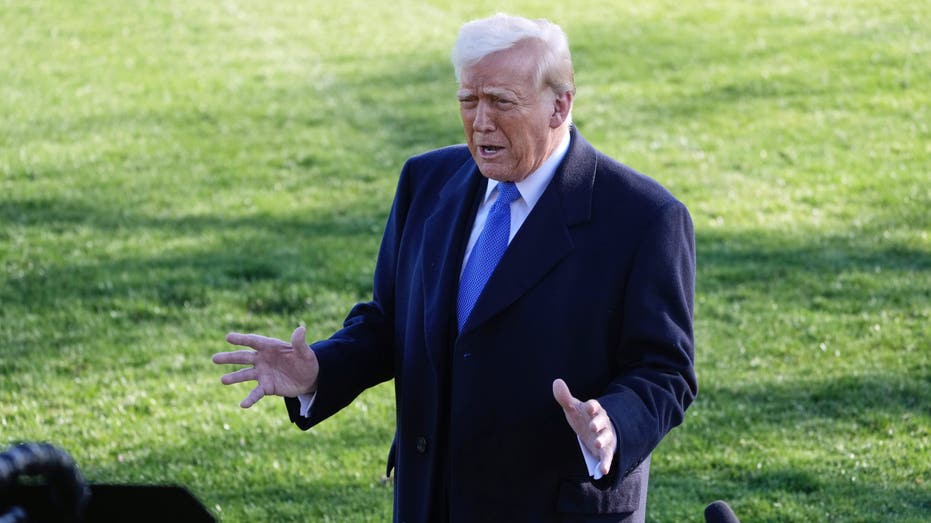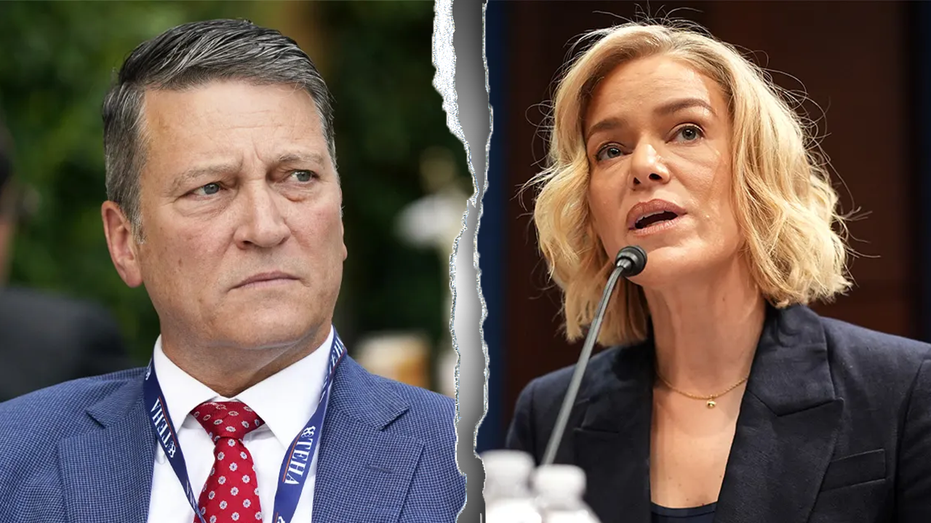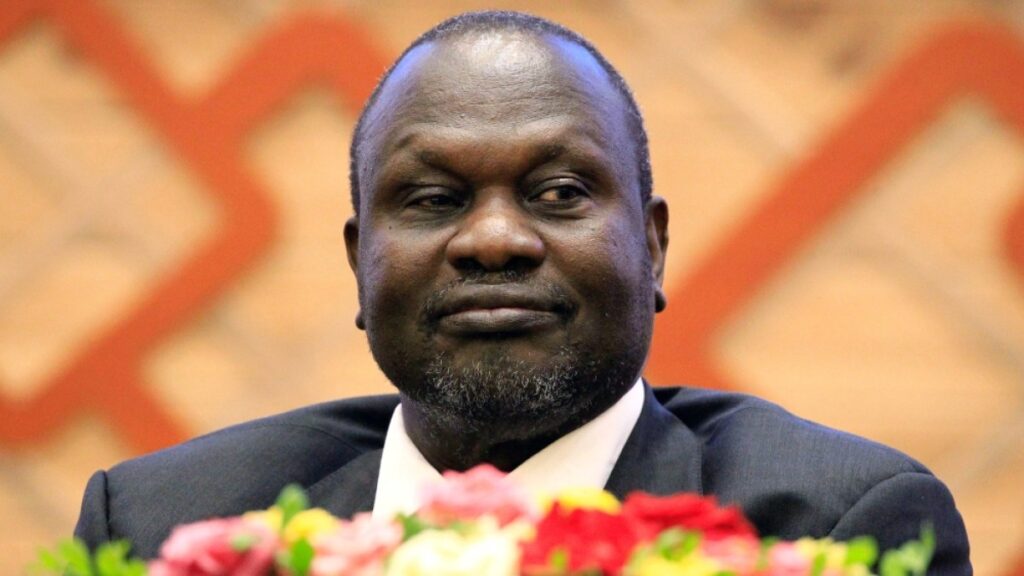Trump admin urged to probe allegations pro-Hamas college groups had ‘prior knowledge’ of Oct 7 attack

FIRST ON FOX: A group of Republican lawmakers is asking the Trump administration to open a probe into whether any anti-Israel groups that have been protesting on college campuses had any prior knowledge of Hamas’ Oct. 7, 2023, terror attack. It comes after similar claims were lodged in an explosive lawsuit that accused specific anti-Israel groups of having prior knowledge of the surprise attack in southern Israel that left more than 1,000 people dead. The lawsuit was filed by people linked to victims of the attack. “US foreign adversaries are engaged in dynamic campaigns to target US students. In the interest of US national security, we should not tolerate any organizations that coordinate with terrorist groups like Hamas on American university campuses or anywhere in our country for that matter,” read a letter led by Rep. Pat Fallon, R-Texas. IVY LEAGUE ANTI-ISRAEL RINGLEADER MAHMOUD KHALIL WITHHELD DETAILS OF FOREIGN TIES FROM VISA APPLICATION: FEDS Fallon and four other House Republicans wrote to Secretary of State Marco Rubio and Attorney General Pam Bondi on Thursday, praising them for working “to remove pro-Hamas agitators from our university campuses.” “We are thrilled that the Trump administration has made it a priority to hold these individuals responsible and, in some cases, begin the process of deportation,” they wrote. Meanwhile, there have been political clashes over the detention of Mahmoud Khalil, a 29-year-old green card holder and Palestinian activist who was a central figure in Columbia University’s controversial anti-Israel protests. VIDEO SHOWS ARREST OF COLUMBIA ANTI-ISRAEL RINGLEADER MAHMOUD KHALIL Khalil was among those named in the lawsuit as allegedly having prior knowledge of Hamas’ attack. His lawyers previously told other outlets that he has no ties to Hamas. But the Republican lawmakers are raising questions of whether groups that fomented demonstrations there and on other college campuses are more intimately familiar with Hamas’ plans than previously known. “With the lawsuit filed this past Monday in the New York Southern District Court against the anti-western activist organizations Within Our Lifetime, Columbia Students for Justice in Palestine (SJP), and other pro-Hamas agitators, evidence has surfaced that suggests these groups may have had prior knowledge of the barbaric attacks planned for October 7, 2023,” they wrote. “For example, Columbia SJP reactivated its dormant Instagram account just minutes before the attacks began and engaged in pro-Hamas messaging afterwards, even going so far as to issue a statement in support of the massacre.” Fox News Digital reached out to an attorney for Khalil but did not immediately hear back.
New poll shows where Trump stands among Americans 9 weeks into his 2nd presidency

President Donald Trump repeatedly touts that America is “back” as he spotlights his accomplishments – some of them controversial – since returning to power in the White House nine weeks ago. Trump has been moving at warp speed in his second tour of duty as president, flexing his political muscles to expand executive powers as he has upended long-standing government policy and made major cuts to the federal workforce through a flurry of executive orders and actions. Additionally, Trump has signed roughly 100 executive orders since his Jan. 20 inauguration, according to a count from Fox News, far surpassing the rate of any recent presidential predecessors during their opening weeks in office. The president touts that “a lot of great things are happening,” but the latest public opinion polling indicates that many Americans do not agree with Trump’s rosy outlook on the job he is doing in office. WHERE TRUMP STANDS IN THE LATEST FOX NEWS NATIONAL POLL Forty-five percent of those questioned in a Reuters/Ipsos poll conducted this past weekend (March 21-23) gave Trump a thumbs up, with 51% saying they disapproved of his performance steering the nation. The survey questioned just over 1,000 adults nationwide. The poll was conducted mostly before the controversy over top White House national security members discussing sensitive operational details of a U.S. military strike in Yemen, on the messaging app Signal, possibly in violation of some federal laws. Trump’s numbers were slightly higher in the most recent Fox News national poll, which was in the field March 14-17. Americans appeared divided on the job the president was doing, with 49% approval and 51% disapproval. An average of all the most recent national polls that asked the presidential approval question indicates that Trump’s approval ratings are just below water. Trump has seen his numbers edge down slightly since the start of his second term, when an average of his polls indicated the president’s approval rating in the low 50s and his disapproval in the mid-40s. Contributing to the slide, the economy and jitters that Trump’s tariffs on America’s top trading partners will spark further inflation, which was a pressing issue that kept former President Joe Biden’s approval ratings well below water for most of his presidency. The president’s 49% overall approval rating in the Fox News poll matches the all-time high for Trump in the network’s polling, which he last reached in April 2020, near the end of his first term in office. That is six points higher than where he stood at this point in his first administration (43% approval in March 2017). Trump’s poll numbers were almost entirely in negative territory in most surveys for the entirety of his first term in office. “Keep these numbers in perspective. The numbers he’s averaging right now are still higher than he was at any point during his first presidency,” veteran Republican pollster Neil Newhouse told Fox News. Daron Shaw, who serves as a member of the Fox News Decision Team and is the Republican partner on the Fox News Poll, highlighted that “the difference is largely a function of the consolidation of the Republican base.” “The party’s completely solidified behind him,” added Shaw, a politics professor and chair at the University of Texas, who noted that Trump’s current rock-solid GOP support was not the case at the start of the first term, when he had troubles with some Republicans. Newhouse also emphasized that Trump’s Republican “base is still strongly behind him.” CLICK HERE TO GET THE FOX NEWS APP It is a similar story with Trump’s popularity. The president’s favorable ratings are slightly underwater, in an average of the latest national surveys, but they remain superior to his standing during his first term in the White House. Additionally, the percentage of Americans who say things are on the right track in the country has jumped to above 40% in a bunch of recent polls. While still in negative territory, they are the most positive right track/wrong track figures in years. So how does Trump stack up with his immediate predecessor? Biden came out of the game in a favorable position, with his approval rating hovering in the low- to-mid-50s during the first six months of his single term as president, with his disapproval in the upper 30s to the low- to-mid-40s. WHAT DEMOCRATS ARE SAYING ABOUT A POSSIBLE BIDEN POLITICAL RESURGENCE However, Biden’s numbers sank into negative territory in the late summer and autumn of 2021, in the wake of his much-criticized handling of the turbulent U.S. exit from Afghanistan, and amid a surge of migrants crossing into the U.S. along the nation’s southern border with Mexico, as well as the rise in inflation. Biden’s approval ratings stayed underwater throughout the rest of his presidency. “He just got crippled and never recovered,” Shaw said of Biden.
France’s Macron says not all European countries agree on force for Ukraine

French President Emmanuel Macron says there was no unanimity regarding proposed deployment of troops in Ukraine after a potential ceasefire. Ukraine’s allies from across Europe did not all agree on the proposed deployment of troops in the country to back up an eventual peace deal with Russia and only some want to take part, French President Emmanuel Macron has said. “It is not unanimous,” he said after wrapping up a summit on strengthening Kyiv’s hand and its military as it pushes for a ceasefire with Moscow. “We do not need unanimity to achieve it.” Macron said France and the United Kingdom, which are driving the initiative, would forge ahead with a “reassurance force” with several countries. Macron hosted the leaders of nearly 30 countries and NATO and European Union chiefs in Paris on Thursday. The summit comes at a crucial juncture in the more than three-year war, with intensifying diplomatic efforts to broker ceasefires amid pressure from US President Donald Trump to end the fighting. Among those who attended were British Prime Minister Keir Starmer and Italy’s Giorgia Meloni, as well as the NATO secretary-general and the Turkish vice president. Advertisement ‘Reassurance force’ Macron said the members of the “reassurance force” were not destined to be peacekeepers, deployed on the front line or any kind of substitute for the Ukrainian army. He emphasised that not all of Ukraine’s European allies would be represented in the force, with some states not “having the capacity” and some reluctant due to the “political context”. The Franco-British delegation would begin talks over where such a force could be deployed. It would have the “character of deterrence against any potential Russian aggression”, he said. Macron said that the summit agreed that he and Starmer would together “co-pilot” Europe’s “coalition of action for stable and durable peace”. The UK-France delegation would also discuss the shape of “tomorrow’s Ukraine army”, Macron said, emphasising the importance of a “strong Ukrainian army, well-equipped for the day after”. Zelenskyy, Macron and Starmer speak at the trilateral meeting on the sidelines of a summit for ‘coalition of the willing’ at the Elysee Palace, in Paris, on March 27, 2025 [Ludovic Marin/Pool/AFP] Macron committed to a further 2 billion euros ($2.16bn) in French military support on Wednesday, including missiles, warplanes and air defence equipment. Zelenskyy said other partners could announce aid packages on Thursday. The meeting comes days after the US said it signed separate agreements with Moscow and Kyiv for a ceasefire in the Black Sea, but Russia presented conditions. They included a demand that sanctions be lifted on Russian state agricultural lender Rosselkhozbank and that it be reconnected to the international payment system SWIFT. Advertisement The European Union, which ejected Rosselkhozbank from SWIFT, said on Wednesday it can be reinstated only when Russia withdraws its troops from Ukraine. The summit format aims to forge a role for Europe in any talks on ending the conflict. While the US was not present, French officials say the outcome of the gathering will be shared with the US administration. Macron spoke with Trump before the meeting, the French presidency said. Adblock test (Why?)
Lt. Gov. Dan Patrick says he’ll push for special session if THC ban, bail changes fail

Only Gov. Greg Abbott can call for a special session. But in his role presiding over the Texas Senate, Patrick can block any bill from passing, giving him leverage to compel overtime sessions by killing must-pass legislation.
Trump anti-sanctuary city executive order could target federal funding, says expert

President Donald Trump is expected to take aim at so-called “sanctuary” jurisdictions with an executive order on Thursday in what is likely to become another legal battle for the administration. Trump hinted earlier this week that an executive order on sanctuary cities may be in the works, telling reporters that he planned to “end sanctuary cities for some of these jurisdictions that aren’t cooperating with law enforcement.” “They’re guarding criminals… we may just end the entire thing all together,” Trump said. YOUNGKIN TO DRAFT SANCTUARY CITY BAN, MAKING STATE FUNDING CONTINGENT ON ICE COOPERATION Sanctuary jurisdictions, or those that limit or completely ban local agencies from cooperating with federal immigration authorities, have come under fire since Trump took office in January, hindering the president’s campaign promise to swiftly deport illegal immigrants from the country. However, what Trump could do with executive action to force more compliance from the jurisdictions remains a question, opening up the possibility of even more legal action against the administration. “While [Trump] works tirelessly to safeguard our communities and strengthen our national security, the radical left continues to weaponize the legal system to oppose common-sense policies,” former Kentucky Attorney General Daniel J. Cameron, who currently serves as the CEO of the 1792 Exchange, told Fox News Digital. “It will surprise no one that the radical left will double and triple down on this strategy.” Trump has faced an unprecedented number of court obstacles during the first few months of his administration, with legal challenges resulting in 15 injunctions at least temporarily blocking his executive actions as of February, according to data compiled by Harvard Law Review. That number already outpaces the total injunctions faced by former Presidents Barack Obama and Joe Biden, who saw 12 and 14 during their entire terms in office, respectively. COLUMBIA UNIVERSITY STUDENT PROTESTER SUES TRUMP ADMIN TO PREVENT DEPORTATION Cameron expects more of the same when it comes to Trump’s looming order on sanctuary cities. “It will surprise no one that the radical left will double and triple down on this strategy,” he said. Given the limitations, Cameron expects Trump’s order to target federal funding for jurisdictions who fail to comply. “Inside of the United States, your zip code should be irrelevant when it comes to enforceable federal law.,” he said. “Cities and states that harbor illegal aliens from federal authorities or otherwise actively interfere with the enforcement of federal law do not deserve taxpayer money or support. Plain and simple. I suspect the executive order will stop taxpayers from being on the hook for the unsafe immigration decisions of local authorities.” CLICK HERE TO GET THE FOX NEWS APP Overall, Cameron believes that Trump’s plan to sign an executive order would be a good start, noting the success the president has had with executive actions to close down the southern border. “Executive orders are a good first step,” Camerson said. “Look at the southern border. We didn’t need new laws for border crossings to plummet from the Biden-era highs. All we needed was a new president with the courage to do something.”
EXCLUSIVE: GOP moves to defund ‘chronically biased’ NPR, PBS after disastrous hearing

EXCLUSIVE: After a hard-hitting hearing by the House DOGE Subcommittee, Rep. Ronny Jackson, R-Texas, is introducing a bill Thursday to pull all government funding from “chronically biased” outlets NPR and PBS, which he says have been “pushing Democrat talking points under the fake banner of ‘public media.’” Jackson’s bill – titled the “No Partisan Radio and Partisan Broadcasting Services Act” or simply the “NPR and PBS Act” – would fully cut off any direct and indirect government funding for both outlets, forcing them to compete instead of being propped up by the government. This comes amid Elon Musk’s sweeping cuts to wasteful government programs through the Department of Government Efficiency. The move also follows a high-intensity House DOGE Subcommittee hearing in which NPR’s Katherine Maher and PBS’ Paula Kerger attempted to explain why their outlets still deserve public funding. DEMOCRATS INVOKE CHILDREN’S SHOWS IN BIZARRE DEFENSE OF PBS, NPR: ‘FIRE ELON, SAVE ELMO’ During the hearing, Maher conceded that NPR botched coverage of Hunter Biden’s infamous laptop, saying, “We made a mistake.” At the time, NPR representatives publicly called the story unserious and a distraction. During the hearing, Maher said, “We were mistaken in failing to cover the Hunter Biden laptop story more aggressively and sooner.” She also expressed regret about remarks she made about President Donald Trump, calling him “a fascist and a deranged racist sociopath.” Meanwhile, Kerger’s PBS was slammed for producing such programs as “Real Boy,” which follows a transgender character exploring sexuality. DOGE Subcommittee Chair Marjorie Taylor Greene, R-Ga., bashed PBS as “one of the founders of the trans child abuse industry.” REP. MARJORIE TAYLOR GREENE SCOLDS NPR CEO OVER PERSONAL VIEWS DURING FIERY DOGE SUBCOMMITTEE HEARING Following the NPR and PBS leaders’ testimonies, Greene called the outlets “out of touch with everyday Americans,” saying: “I think from what we have heard here today, the American people will not continue to allow such propaganda to be funded through the federal government with their hard-earned tax dollars.” Jackson told Fox News Digital that though NPR and PBS were originally founded to produce non-biased, informational and educational content, the outlets have since “turned into taxpayer-funded propaganda machines for the radical left, pushing Democratic talking points under the fake banner of ‘public media.’” A statement by Jackson’s office further said the two outlets’ “chronically biased” programming has made them simply a “messaging arm for woke, radical Democrats.” “Hardworking Americans are sick of footing the bill,” said Jackson. “It’s time to cut them off and stop forcing taxpayers to pay for their liberal lies!” EXCLUSIVE: HOUSE GOP FIREBRAND DRIVES DOGE COMMITTEE INVESTIGATION OF GOVERNMENT MEDIA AGENCY CORRUPTION Trump has expressed he is open to defunding NPR and other “biased” publicly funded outlets, meaning he would be likely to sign a bill doing so if passed by Congress. “They spend more money than any other network of its type ever conceived, so the kind of money that’s being wasted, and it’s a very biased view, you know that better than anybody,” said Trump. “And I’d be honored to see it end.” Musk has also called to defund NPR. In February, he posted a 2022 video of Maher in which she said, “Our reverence for the truth might have become a bit of a distraction that is preventing us from finding consensus and getting things done.” Commenting on Maher’s speech, Musk said NPR “should survive on its own.” Fox News Digital’s Brian Flood and Joseph A. Wulfsohn contributed to this report.
US immigration officials detain Turkish student over pro-Palestine views
[unable to retrieve full-text content] Video shows masked and plain-clothed US federal agents detaining a Turkish PhD student from Tufts University.
South Sudan opposition says vice president’s arrest ends peace deal

A power-sharing deal between Kiir and Machar is unravelling, threatening a return to South Sudan’s blood civil war. South Sudan’s opposition has said that the overnight arrest of First Vice President Riek Machar, longtime rival to President Salva Kiir, has invalidated their 2018 peace deal and risked plunging the country back into war. A convoy of 20 heavily armed vehicles entered Machar’s residence in the capital, Juba, late on Wednesday and arrested him, according to a statement issued by a member of his party – a dramatic escalation of a conflict that has been building for weeks in the world’s youngest country. Al Jazeera’s Malcolm Webb, reporting from Nairobi, said that “military vehicles came to his [Riek Machar’s] residence in the night and forcibly disarmed all of his guards. They removed all of the phones and the laptops from the property, arrested the guards and took them away to an unknown location, leaving only Machar at the residence.” Webb said that “the area has been cut off by soldiers. In other parts of the city, life is continuing as normal. This comes off the back of weeks of escalating violence which IO [the Sudan People’s Liberation Army In Opposition, or SPLM/IO] describes as a series of attacks by President Kiir’s forces, in breach of the peace deal.” Advertisement Peace and stability at risk A power-sharing deal between Kiir and Machar has been gradually unravelling, threatening a return of the civil war that killed around 400,000 people between 2013 and 2018. “The prospect for peace and stability in South Sudan has now been put into serious jeopardy,” said Oyet Nathaniel Pierino, deputy chairman of Machar’s party. There was widespread international condemnation, including from the United Nations Mission in South Sudan (UNMISS), warning that the reported arrest left the country “on the brink of relapsing into widespread conflict”. The US Department of State on Thursday called on Kiir to “reverse this action and prevent further escalation” in a post on X. Analysts say that Kiir, 73, has been seeking to ensure his succession and sideline Machar for months through cabinet reshuffles. Daniel Akech, a senior analyst on South Sudan for International Crisis Group, told Al Jazeera that “the agreement of 2018 was centred on two key issues. One was to create a constitution acceptable to all parties. The other one, which was really the key, was power sharing. And part of the power sharing was about military power sharing between the opposing sides.” Akech said that “the president had fired a governor in February who was supposed to be on the opposition led by Machar. He also recently fired the governor in Upper Nile – who was supposed to be with the opposition.” “So, this is clearly a power grab,” he said. “As we speak, this process is no longer binary,” Akech said. “We are talking about the president and vice president as though they are the only two actors, but there are plenty within the opposition who are opposed to the government. So, if this escalates to violence, this could be very decentralised with multiple actors, making it difficult to put the fire out.” Advertisement Adblock test (Why?)
Who are the students Trump wants to deport?

On Tuesday, US authorities detained and revoked the student visa of Tufts University student, Rumeysa Ozturk, a Turkish national who had voiced her support for Palestinians affected by the Gaza war. Ozturk’s arrest is the latest instance of President Donald Trump’s administration acting against international college students over their support for Palestinians during the Gaza solidarity encampments that erupted across university campuses last year. Students who protested for Palestine are having their legal visas and residence status revoked and are being arrested and detained. Here is more about the US university students who have been detained so far: Why does Trump want to deport US students? The Trump administration alleges that the students who participated in pro-Palestine protests spread anti-Semitism and pro-Hamas sentiment on campus — a claim students, lawyers and activists have all rebutted. Jewish activists and groups have been at the forefront of many of the most prominent protests in the US against the Gaza war. Advertisement On January 29, Trump signed an executive order titled “Additional Measures to Combat Anti-Semitism”, in which he ordered the head of each executive department or agency to submit a report within 60 days on all criminal and civil authorities and actions available for fighting anti-Semitism. The White House published a fact sheet a day after this order. In the fact sheet, Trump said: “To all the resident aliens who joined in the pro-jihadist protests, we put you on notice: come 2025, we will find you, and we will deport you. I will also quickly cancel the student visas of all Hamas sympathizers on college campuses, which have been infested with radicalism like never before.” His administration has since targeted multiple international students and scholars in the US. Rumeysa Ozturk Security camera footage from Tuesday evening shows six individuals in plainclothes taking Ozturk into custody near her apartment in Somerville, Massachusetts. Some of these officers were partially covering their faces. Ozturk had headed out alone to meet her friends for Iftar, the evening meal to break her Ramadan fast. The 30-year-old is a Turkish national and a Fulbright Scholar in Tufts’ doctoral programme for Child Study and Human Development. She has been in the US on a valid student visa. On March 26, 2024, Ozturk co-wrote an opinion piece for her university’s student news website, the Tufts Daily, with four other students. In this piece, the authors criticised the institute’s President Sunil Kumar, who sent an email dismissing resolutions passed by the Tufts Community Union Senate, which called for the university to divest from companies linked to Israel and “acknowledge the Palestinian genocide”. Advertisement Ozturk’s lawyer, Mahsa Khanbabai, filed a petition in Boston federal court late on Tuesday, arguing that Ozturk had been unlawfully detained. As a result, US District Judge Indira Talwani ordered US Immigration and Customs Enforcement (ICE) not to move Ozturk out of Massachusetts without 48 hours notice. Despite this, Ozturk was moved to Louisiana by Wednesday night, according to her lawyer. US Department of Homeland Security (DHS) spokesperson Tricia McLaughlin wrote in an X post on Wednesday: “DHS + ICE investigations found Ozturk engaged in activities in support of Hamas, a foreign terrorist organization that relishes the killing of Americans.” McLaughlin did not specify what these activities were. “A visa is a privilege not a right. Glorifying and supporting terrorists who kill Americans is grounds for visa issuance to be terminated. This is commonsense security,” McLaughlin wrote. “We are unaware of her whereabouts and have not been able to contact her. No charges have been filed against Rumeysa to date that we are aware of,” Khanbabai said in a statement. Tufts University President Sunil Kumar said in a written statement that the university was not informed before this arrest. “From what we have been told subsequently, the student’s visa status has been terminated, and we seek to confirm whether that information is true,” Kumar said. The video of Ozturk’s arrest was captured on 32-year-old software engineer Michael Mathis’s security camera. “It looked like a kidnapping,” he said, according to a report by AP. “They approach her and start grabbing her with their faces covered. They’re covering their faces. They’re in unmarked vehicles.” Advertisement On Wednesday, hundreds of people gathered in Somerville to protest the arrest of Ozturk, demanding her release. Standing with thousands of Somerville residents to denounce the sickening, unlawful abduction of Tufts graduate student Rumeysa Ozturk by masked federal agents last night. We need to bring Rumeysa home and organize a coordinated defense of our immigrant neighbors and our rights. pic.twitter.com/LSGLLlraIi — Mike Connolly (@MikeConnollyMA) March 27, 2025 Mahmoud Khalil On March 8, ICE agents arrested Mahmoud Khalil, a recent Columbia University graduate who was the lead negotiator for Columbia University Apartheid Divest (CUAD) during the campus protests last year. He was taken from his university-owned New York City apartment while his wife, Noor Abdalla, who is eight months pregnant, recorded the arrest on her phone. This marked the first publicly known student deportation effort of its kind under the Trump administration. McLaughlin alleged Khalil “led activities aligned to Hamas, a designated terrorist organization,” but no evidence for this was provided. Abdalla said that the agents did not show a warrant while making the arrest. Khalil was transferred to an ICE processing facility in Jena, Louisiana. At the time of arrest, Khalil was a permanent resident with a green card. When the ICE agents were told that Khalil had a green card, they said that this would be revoked. US Secretary of State Marco Rubio posted the link to a news article about Khalil’s arrest, captioning it “We will be revoking the visas and/or green cards of Hamas supporters in America so they can be deported.” Advertisement On March 10, Trump posted on his Truth Social platform: “Following my previously signed Executive Orders, ICE proudly apprehended and detained Mahmoud Khalil, a Radical Foreign Pro-Hamas Student on the campus of Columbia University.” Trump added that Khalil’s arrest was the first of many. “We will find, apprehend, and
HHS says it will cut workforce by 10K, saving $1.8B annually

The U.S. Department of Health and Human Services (HHS) announced that it will lay off about 10,000 full-time employees. The move is projected to save taxpayers $1.8 billion annually. What the department billed as a “dramatic restructuring” comes in response to President Donald Trump’s executive order implementing the Republican’s “Department of Government Efficiency Workforce Optimization Initiative.” HHS said it expects a total downsizing of between 82,000 to 62,000 full-time employees when combining this latest effort with early retirement and the results of the Fork in the Road, the deferred resignation offer of full pay and benefits until September. RFK JR. DETAILS FIRST BABY FORMULA REVIEW IN DECADES AMID CONCERNS OVER CONTAMINANTS, SUPPLY CHAIN “We aren’t just reducing bureaucratic sprawl. We are realigning the organization with its core mission and our new priorities in reversing the chronic disease epidemic,” HHS Secretary Robert F. Kennedy, Jr. said in a statement. “This Department will do more – a lot more – at a lower cost to the taxpayer.” “Over time, bureaucracies like HHS become wasteful and inefficient even when most of their staff are dedicated and competent civil servants,” Kennedy added. “This overhaul will be a win-win for taxpayers and for those that HHS serves. That’s the entire American public, because our goal is to Make America Healthy Again.” Thursday’s announcement is intended to streamline the functions of HHS. The department said the 28 divisions of HHS contain “many redundant units,” and the restructuring plan will consolidate them into 15 new divisions, including a new Administration for a Healthy America, or AHA. It also will “centralize core functions” such as Human Resources, Information Technology, Procurement, External Affairs, and Policy, the department said. Five of the 10 regional offices will shut down. The reorganization of the department is also meant to implement “the new HHS priority of ending America’s epidemic of chronic illness by focusing on safe, wholesome food, clean water, and the elimination of environmental toxins.” MILLIONS SPENT BY BIDEN ON COVID ‘VACCINE HESITANCY’ CAMPAIGN SLASHED BY TRUMP NIH: REPORT The AHA – described as a “new, unified entity” – will encompass the Office of the Assistant Secretary for Health (OASH), Health Resources and Services Administration (HRSA), Substance Abuse and Mental Health Services Administration (SAMHSA), Agency for Toxic Substances and Disease Registry (ATSDR), and National Institute for Occupational Safety and Health (NIOSH). The department said the centralization “will improve coordination of health resources for low-income Americans and will focus on areas including Primary Care, Maternal and Child Health, Mental Health, Environmental Health, HIV/AIDS, and Workforce development.” HHS said transferring SAMHSA to AHA “will increase operational efficiency and assure programs are carried out because it will break down artificial divisions between similar programs.” The restructuring is also meant to strengthen the Centers for Disease Control and Prevention (CDC). HHS said the Administration for Strategic Preparedness and Response (ASPR), responsible for national disaster and public health emergency response, will transfer to the CDC, “reinforcing its core mission to protect Americans from health threats.” Notably, Trump earlier this week named Susan Monarez, the current acting director of the CDC, to hold that position permanently. Her nomination replaces Trump’s original pick for the role, Dr. David Weldon. HHS said Thursday it will create a new Assistant Secretary for Enforcement to oversee the Departmental Appeals Board (DAB), Office of Medicare Hearings and Appeals (OMHA), and Office for Civil Rights (OCR) to “combat waste, fraud, and abuse in federal health programs.” The department will also merge the Assistant Secretary for Planning and Evaluation (ASPE) with the Agency for Healthcare Research and Quality (AHRQ) to create the Office of Strategy “to enhance research that informs the Secretary’s policies and improves the effectiveness of federal health programs.” CLICK HERE TO GET THE FOX NEWS APP The department said “critical programs that support older adults and people with disabilities will be integrated into other HHS agencies, including the Administration for Children and Families (ACF), ASPE, and the Centers for Medicare and Medicaid Services (CMS).” HHS said the reorganization will not impact Medicare and Medicaid services.
